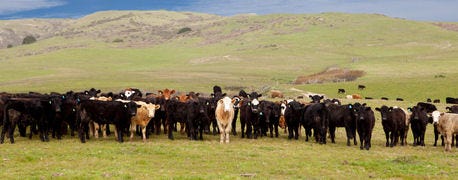March 6, 2014

Cows that have had a run-in with wolves can experience stress-related illnesses and have a harder time re-breeding, according to a new study by Oregon State University researchers.
That means lost profitability for farmers and ranchers.
"When wolves kill or injure livestock, ranchers can document the financial loss," said Reinaldo Cooke, an animal scientist in OSU's College of Agricultural Sciences. "But wolf attacks also create bad memories in the herd and cause a stress response known to result in decreased pregnancy rates, lighter calves and a greater likelihood of getting sick. It's much like post-traumatic stress disorder – PTSD – for cows."

Oregon State Research suggests cows witnessing wolf attacks suffer symptoms similar to PTSD
Test the theory
After a reintroduction to Yellowstone National Park in the last two decades, grey wolves have dispersed through the West and have hunted in livestock grazing areas. Since then, OSU researchers have heard anecdotes from ranchers that cows that have come in contact with wolves are more aggressive, sickly and eat less.
To measure the stress of a wolf attack on cows and estimate its lingering effects, researchers simulated a wolf encounter with 100 cows. Half of them had never seen a wolf, and the other half had been part of a herd that was previously attacked on the range.
Related: USDA Expands Research on Livestock Protection Dogs
Cows were gathered in a pen scented with wolf urine while pre-recorded wolf howls played over a stereo. Three trained dogs – German Shepherds closely resembling wolves – walked outside the pen.
Stress hormones
Researchers found that cortisol, a stress hormone, increased by 30% in cows that had previously been exposed to wolves. They bunched up in a corner, formed a protective circle and acted agitated. Their body temperatures also increased rapidly, another indicator of stress. Yet the cows previously unfamiliar with wolves were curious about the dogs and did not show signs of stress.
Multiple studies from Cooke and other researchers have established a link between cow stress and poor performance traits that can cost ranchers.
Related: Better Guard Dogs May Help Livestock Against Big Predators
A 2010 OSU economic analysis estimated that wolves in northeastern Oregon could cost ranchers up to $261 per head of cattle, including $55 for weight loss and $67 for lower pregnancy rates, according to John Williams, an OSU extension agent in Wallowa County who conducted that study.
"In a herd, if you are not raising calves, your cows are not making you money," said David Bohnert, an expert in ruminant nutrition at OSU's Eastern Oregon Agriculture Research Center in Burns. "With stress likely decreasing the proportion of those getting pregnant and causing lighter calves from those that do, a wolf attack can have negative financial ripple effects for some time."
Both researchers call for further research into ways of successfully managing both wolves and livestock so they can co-exist.
The wolf-cow simulated encounter study, which was funded by the Oregon Beef Council, was published in the Journal of Animal Science and co-authored by Cooke and Bohnert.
You May Also Like




